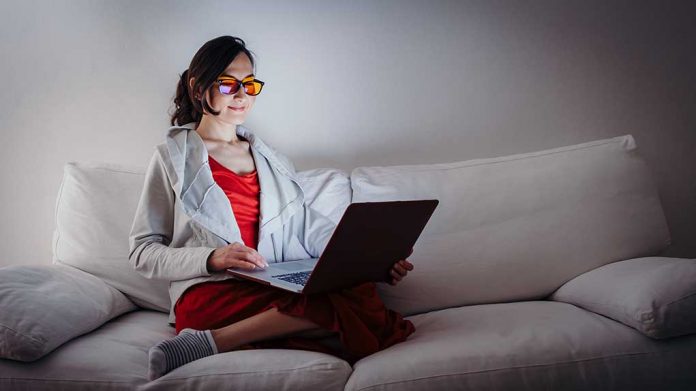
(AscendHealthy.com) – One way people protect themselves from eye strain while using digital screens is through blue-light-blocking glasses. But the science behind these devices may not support their use. As it turns out, eye strain, dry eyes, and other computer-related problems may not come from the blue light the screens emit, after all. Let’s take a look at what we know.
Blue-Light-Blocking Glasses Are Trendy
People are buying a lot of blue-light-blocking glasses today. They’re trendy and popular, and some companies suggest them for their employees. Individuals are buying them also to use in their work-at-home duties. The idea behind them is that digital screens emit blue light and that light may affect people’s natural circadian rhythms. That could cause sleep problems, eye strain, and other worries.
What Does Science Say?
Science actually doesn’t say much about blue light or about the glasses that claim to block it and make our eyes feel better. These glasses claiming to reduce blue light mostly came out of nowhere, without scientific backing or information. There haven’t been big studies done on these glasses, and the evidence as to their effectiveness isn’t readily available. But people believed the claims, and the glasses became widely available online and in stores.
Are These Glasses a Fad?
It appears blue-light-blocking glasses are mostly a fad. Right now, they’re popular because people are working from home and using their computers so much. There’s all the screen time with Zoom calls, online learning, and more. Because of that, and because that can contribute to tired, dry eyes, people are looking for something that can help.
Unfortunately, there’s nothing scientific to indicate these glasses actually make a difference. Experiments have shown that people who use them don’t really complain less about eye issues related to computer usage. While some people may feel like they get benefits from these glasses, it’s most likely a placebo effect.
Other Ways to Reduce Eye Strain
Fortunately, we don’t need anything trendy to reduce eye strain and other computer-based visual woes. For example, blinking more frequently may help keep eyes lubricated. Coupled with looking around instead of staring at the screen for too long, that may make eyes feel better and reduce eye strain.
Also, consider sitting a little farther away from your computer and not using your devices for a couple of hours before bedtime. The light emitted from computer screens may reduce melatonin, making it more difficult to fall asleep. That lack of sleep might contribute to eyes that feel gritty or dry and could increase the discomfort associated with computer use.
Overall, using a computer for long periods will put some strain on our eyes. But blue-light-blocking glasses probably aren’t the answer. Instead, keeping eyes lubricated, looking away from the screen to refocus, blinking, and getting enough sleep may be better and more effective ways to reduce eye strain and discomfort.
~Here’s to Your Healthy Ascension
Copyright 2021, AscendHealthy.com




















